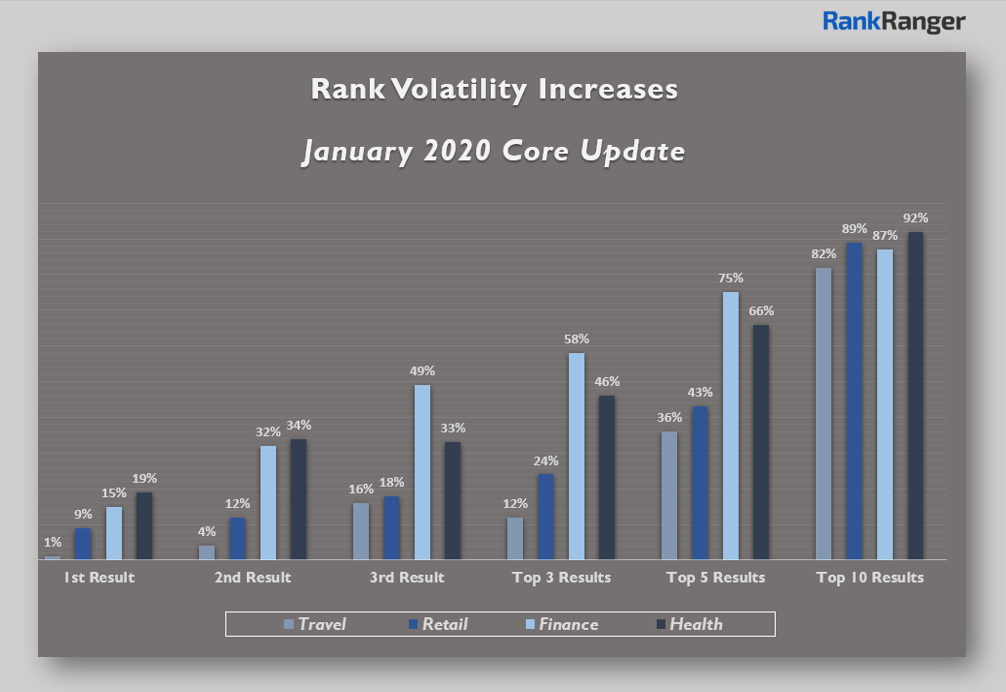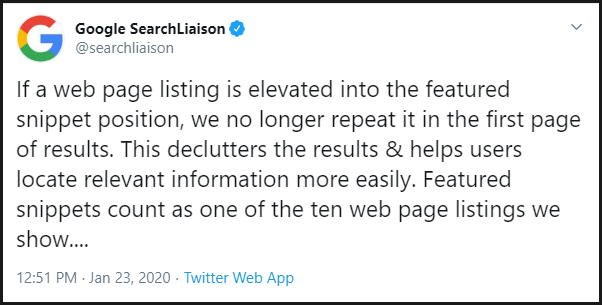Posted on 2/18/2020 in Digital Marketing
On January 16th, Google completed the roll-out of its latest broad core update. Google provides very little information about these large algorithm updates so now that it’s been out for about a month, we have been able to gather some information about its impact.
What is a Google Broad Core Algorithm Update?
Google changes their algorithm in some capacity every day but broad core algorithm updates happen only a few times a year and cause much greater fluctuation with search results. Core updates are global updates that are not specific to any particular region, language or type of website. The reason for these updates is to improve search quality and provide more relevant results.
Broad core updates have wide-reaching impacts that causes major shifts in page rank across the globe. Building off of the recent BERT algorithm update in October 2019, this latest update also focuses on improving contextual search results.
With each update, Google reevaluates the SERP ranking of websites based on expertise, authoritativeness, and trustworthiness, also known as E-A-T. These are some of the main criteria that Google uses to identify high-quality pages. The full Search Quality Rating guidelines can be found here but at the highest level, Google ranks pages more highly based on the quality of the content itself versus the quality of the site.
The other key factors that Google uses to determine quality content are:
Beneficial Purpose: the page should have a clear, user-focused purpose that benefits its user in some manner. Examples of a beneficial purpose are to share information, to entertain, or to sell products/services.
YMYL: This stands for Your Money or Your Life content, which is content that can have the biggest impact on a user’s health, happiness, financial well-being, or safety if it’s inaccurate or deceptive. Google has increasingly high standards for YMYL pages.
What We Have Seen with The January 2020 Update So Far
Unsurprisingly, YMYL websites appear to be most affected by the algorithm updates so industries such as Health, News and Finance have seen some of the biggest changes in SERP rankings.
Rank Ranger noted a lot of shakeup in these industries especially in the top 10 search results:

A variety of online tracking tools reported major SERP volatility that correlated to the timing of the January Google Core update.
From SEMRush:

Ranking Factors
Pages that included the following items seemed to benefit from this core update:
- Use of authoritative and trustworthy references for YMYL content
- Clear information on monetization methods
- Blatant identification of sponsored/affiliate content
- Relevant, up-to-date information
- A good online reputation
Alternatively, content that is spammy or untrustworthy is considered low quality and may no longer be indexed. This includes deceptive practices, such as pretending to mimic an official organization that you are not actually affiliated with. Thin content is also being penalized.
Featured Snippet Update
Although not technically part of the January 16th Core Update, Google also released another important algorithm update on January 22nd. The purpose of this update was deduplication - removing duplicate URLs from SERPs that contained featured snippets.
Prior to this update, Google would display a URL that ranked with a featured snippet in “position zero” at the top of the page above the normal search results and then again within the search results.
Google’s SearchLiaison Twitter account posted an update on January 23rd explaining the update, which launched globally.

This deduplication does not impact video featured snippets, top stories, or interesting finds.
How to Recover from the January 2020 Core Update
There is technically no “fix” for this update. It’s all about the quality of your content. If you find yourself negatively impacted by the latest core update, then it will be important to examine your current content strategy. The way to create high ranking content means writing content that is relevant to the search intent of your target audience. Consider the way that people search - this might include voice search and broader, topic-based searches.
Increase Your E-A-T Quality
Expertise (E), Authoritativeness (A), and Trustworthiness (T) must factor heavily into your content strategy to ensure a high-quality rating from Google. Here are just a few ways to use E-A-T to increase the value of your pages:
- Add author name and bio so that readers can understand who is responsible for the content
- Use SSL on your site so that visitors can trust the security
- Moderate user-generated content to remove false or inaccurate information
- Back up your content with supporting data and cite your sources
- Curate your backlinks and work on getting links from trusted sites
- Use reviews and testimonials to increase the trust factor
Review Google’s Content Quality Questionnaire
In August of last year, Google posted the article, “What webmasters should know about Google’s core Updates.” Within this article, they provide a set of questions to ask yourself to help you assess your content and find opportunities for optimization. These questions are broken up into 4 categories: Content and Quality, Expertise, Presentation and Production, and Comparative questions.
They recommend that you audit the content that was most impacted by reviewing these questions and also looking at the types of searches. This may show you where there is a mismatch of page content versus search intent.
There is no magic potion to shield yourself from the impact of Google’s ongoing algorithm updates but by following all of the advice above, you can mitigate your risk and improve your content quality. As search continues to favor human behavior, high-quality content will continue to rise to the top of SERP rankings.
Need help with your marketing plan?
Our experienced team can assist you with all of your web and digital marketing needs.
Related Articles

How Do I Optimize My Website for AI?
Why do you need to optimize your website for AI?AI-powered search engines like Google’s AI Overview, Perplexity, and tools such as Microsoft's [...]

Outdated or Outstanding? How to Tell If Your Website Needs a Refresh
Your website is the digital face of your business. It serves as a first impression, a marketing tool, and a resource for potential customers. [...]

Preparing a Website Redesign Budget for 2025: A Step-by-Step Guide
As we approach 2025, businesses are recognizing the necessity of a fresh, user-friendly website to stay competitive in a rapidly evolving digital [...]
